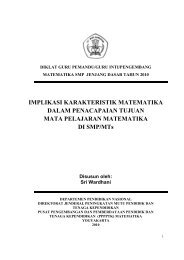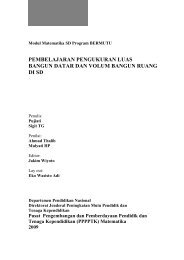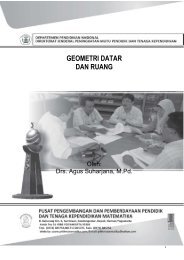25 Biggest Mistakes Teachers Make and How to Avoid Them
25 Biggest Mistakes Teachers Make and How to Avoid Them
25 Biggest Mistakes Teachers Make and How to Avoid Them
Create successful ePaper yourself
Turn your PDF publications into a flip-book with our unique Google optimized e-Paper software.
56 Teacher–Student Relations<br />
point <strong>to</strong> focus on the students who<br />
had the worst performance. This is<br />
not a common practice among teachers.<br />
They usually focus on the <strong>to</strong>pscoring<br />
students. She made very<br />
destructive criticisms <strong>and</strong> comparisons<br />
about these students in front of<br />
the class.<br />
Apparently, she thought public<br />
disclosure would motivate the two<br />
students <strong>to</strong> improve their performance.<br />
Her personal attacks on the<br />
students were unprofessional <strong>and</strong><br />
ineffective; these attacks only served<br />
<strong>to</strong> make the students hate the teacher<br />
<strong>and</strong> the class. She made her low<br />
expectations <strong>and</strong> poor perceptions<br />
of these students very evident.<br />
Although the student managed <strong>to</strong><br />
pass the course, she didn’t feel that<br />
she had learned anything in the class.<br />
Perhaps she was misplaced because<br />
she felt she actually learned in a regular<br />
math class.<br />
A simple remediation strategy<br />
for students performing poorly in<br />
an advanced class is <strong>to</strong> offer them<br />
retreat privileges without penalty. If<br />
students feel that they are not doing<br />
well in a course, they can take the<br />
class that’s a level lower <strong>and</strong> not lose<br />
their honors status. Responsible<br />
teachers may opt <strong>to</strong> offer lagging students<br />
more instructional assistance.<br />
They realize that honors students<br />
encounter difficulty in certain courses<br />
just like any other students. They can<br />
reasonably expect a high level of<br />
au<strong>to</strong>nomy <strong>and</strong> responsibility from<br />
honors students, but when it seems<br />
that someone is drowning alone in<br />
their own little pool, it’s the teacher’s<br />
responsibility <strong>to</strong> jump in <strong>and</strong> give<br />
some assistance <strong>and</strong> reteach problem<br />
concepts when necessary. I <strong>to</strong>ok a<br />
graduate calculus course that was<br />
practically self-taught. The professor<br />
gave us copies of his typed manuscript<br />
as our text. We were thrown<br />
in<strong>to</strong> the choppy waters of calculus<br />
<strong>and</strong> we had <strong>to</strong> sink or swim <strong>to</strong> survive.<br />
We had <strong>to</strong> complete so many<br />
chapters <strong>and</strong> take a test before we<br />
could move <strong>to</strong> the next level. By the<br />
time we were ready for Integral<br />
Calculus, many of us were sinking<br />
fast. Finally, in a desperate move <strong>to</strong><br />
save the class, the professor started<br />
having class again <strong>and</strong> actually<br />
started teaching the course material.<br />
He made no comments or jokes about<br />
our poor performance. His assistance<br />
helped us <strong>to</strong> regain our confidence <strong>and</strong><br />
pass the course. Effective teachers are<br />
alert <strong>to</strong> stu dent difficulty <strong>and</strong> assume<br />
the role of instruc<strong>to</strong>r or facilita<strong>to</strong>r,<br />
whichever is most appropriate for the<br />
learning situation.





